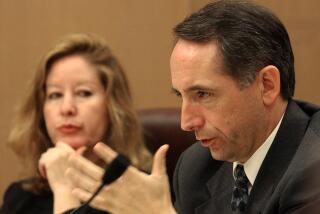High Court Disbars Lawyer Accused of DMV Bribery
- Share via
SAN FRANCISCO — The state Supreme Court on Monday ordered the disbarment of a Torrance attorney charged with passing $400 concealed in matchbooks to a Department of Motor Vehicles hearing officer in return for favorable rulings.
The justices rejected contentions by the lawyer, Barry G. Sands, 45, that there was not enough evidence to warrant disbarment and that the money was a loan.
“All that matters here is that (Sands) passed something of value to (the officer) . . . ,” the court said in an unsigned 19-page opinion. “What is crucial here is the fact that the passing of the money amounted in substance and effect to being a bribe.”
Sands declined comment.
The court’s action came in a professional discipline case that emerged from a 17-month criminal investigation by Los Angeles County authorities into the activities of Michael R. Tarrish, a DMV hearing officer in Long Beach empowered to decide whether to revoke or suspend driver’s licenses.
Tarrish, who told investigators he had received payments from several attorneys, including Sands, in exchange for favorable decisions, was dismissed by the DMV in 1987 and placed on three years’ probation after pleading no contest to accepting a bribe.
In proceedings before the State Bar of California, Tarrish said that Sands on four separate occasions had bought him lunch, discussed his clients’ cases and each time passed him a matchbook containing a $100 bill. Sands said he gave Tarrish the money because Tarrish had told him of some personal financial problems. A hearing panel of the Bar and the Bar’s disciplinary review department urged disbarment.
In his appeal to the state Supreme Court, Sands denied he had done anything unethical, saying it was “common practice” among attorneys to discuss their cases informally with DMV hearing officers. He contended further that he should not be punished on the dubious testimony of Tarrish, whose cooperation with the Bar was required under the conditions of his probation.
The justices agreed that Tarrish’s testimony should be given careful scrutiny but noted that the hearing panel had found his account “convincing” and “credible.”
More to Read
Sign up for Essential California
The most important California stories and recommendations in your inbox every morning.
You may occasionally receive promotional content from the Los Angeles Times.













